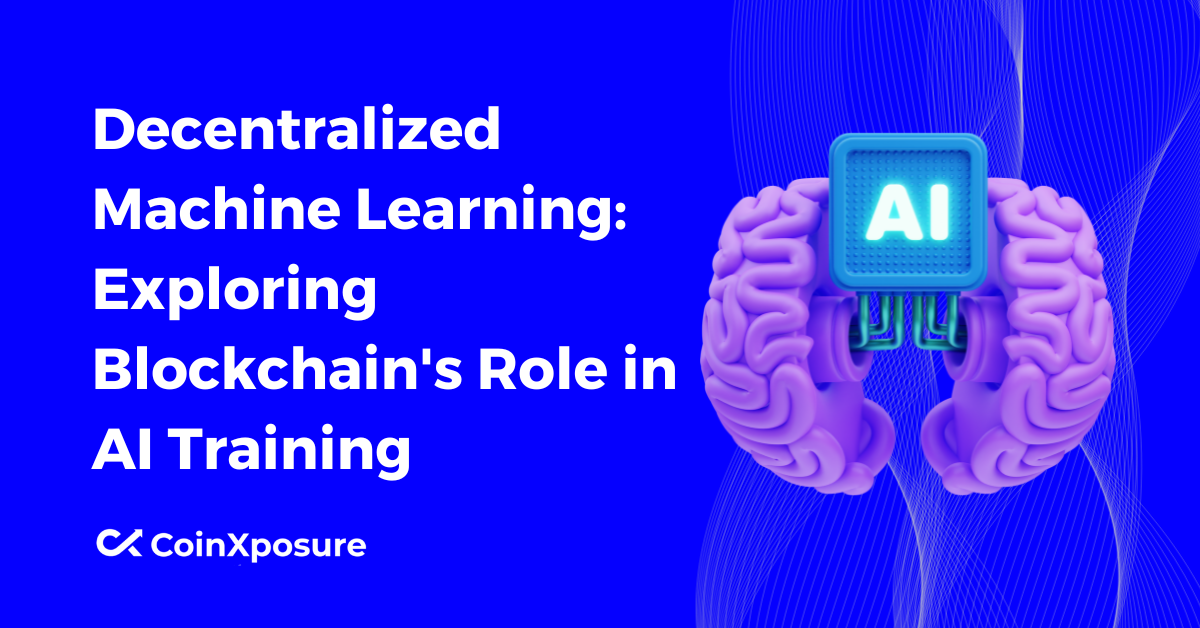
Decentralized Machine Learning – Exploring Blockchain’s Role in AI Training
Decentralized Machine Learning (DML) revolutionizes traditional AI training methodologies by distributing the process across a network of nodes, eliminating the need for a central authority. This approach introduces a new era of privacy, security, and efficiency in machine learning.
One of the key enablers of DML is blockchain technology, offering a secure and transparent framework. This exploration delves into how blockchain is pivotal in reshaping AI training, fostering decentralized data management, transparent transactions, and innovative incentives within the machine learning landscape.
Overview of Decentralized Machine Learning
Decentralized Machine Learning (DML) is the paradigm where machine learning models are trained across a network of decentralized devices or nodes, eliminating the need for a central authority or server.
In this approach, data is distributed across multiple devices, and model training occurs locally or through collaborative efforts, fostering privacy, security, and efficiency.
Blockchain technology often plays a crucial role in enabling decentralized machine learning by providing a secure and transparent framework for managing data, transactions, and incentives within the network.
DML offers advantages such as improved data privacy, enhanced scalability, and the potential for more inclusive and fair AI ecosystems.
Overview of Blockchain Technology
Blockchain technology is a decentralized and distributed ledger system that securely records and verifies transactions across a network of computers.
It consists of a chain of blocks, each containing a list of transactions linked together through cryptographic hashes. Key features include decentralization, immutability, transparency, and consensus mechanisms.
Blockchain finds applications beyond cryptocurrencies, notably in sectors like finance, supply chain, healthcare, and, more recently, in decentralized machine learning. Its ability to ensure transparency, security, and tamper-resistant data makes it crucial in various innovative solutions and industries.
Role of Blockchain in AI Training
Blockchain plays a significant role in AI training by addressing key challenges associated with centralized approaches. Its role can be summarized in several key aspects:
- Decentralized Data Management
- Data Ownership and Control
- Smart Contracts for Transparency
- Tokenization and Incentives
- Security and Immutability
Decentralized Data Management
Enables secure and decentralized storage of data across the network. Reduces the reliance on a central repository, enhancing data privacy and minimizing the risk of single points of failure.
Data Ownership and Control
Empowers individuals to own and control their data through cryptographic keys. Allows for selective data sharing, ensuring participants maintain sovereignty over their information.
Smart Contracts for Transparency
Smart contracts automate and enforce agreements within the network. Enhances transparency in AI training processes, ensuring clear rules and incentives for participants.
Tokenization and Incentives
Tokens on the blockchain can represent value and serve as incentives for data sharing and model training. Encourages active participation and contribution to the AI training process.
Security and Immutability
Provides a tamper-resistant and transparent record of transactions. Enhances the security of AI models and training data by preventing unauthorized modifications.
Integrating blockchain in AI training introduces a decentralized and trustless environment, addressing privacy, security, and transparency concerns while fostering collaborative and incentivized machine learning processes.
Challenges and Considerations of Decentralized Machine Learning
Decentralized Machine Learning (DML) with blockchain integration faces several challenges and considerations:
- Scalability
- Performance Issues
- Regulatory and Ethical Concerns
- Interoperability
- Energy Consumption
- Data Privacy and Security
Scalability
Scalability remains a significant hurdle as the size of the blockchain grows, impacting the speed and efficiency of AI training processes.
Performance Issues
The computational demands of blockchain transactions can hinder the performance of real-time AI applications, requiring innovative solutions to balance efficiency.
Regulatory and Ethical Concerns
Compliance with existing regulations and ethical standards poses challenges, particularly in industries with stringent data protection and privacy laws.
Interoperability
Achieving seamless interoperability between blockchain platforms and AI systems is crucial for widespread adoption but can be complex.
Energy Consumption
Proof-of-work consensus mechanisms, common in blockchain, can lead to high energy consumption, raising environmental concerns.
Data Privacy and Security
While blockchain enhances data security, ensuring the privacy of sensitive information during AI training remains a critical consideration.
Navigating these challenges and considerations is essential for successfully integrating blockchain in decentralized machine learning, promoting a balance between innovation, security, and ethical considerations.
Future Prospects and Developments of Decentralized Machine Learning
The future of decentralized machine learning (DML) with blockchain integration holds promising developments and advancements:
- Enhanced Scalability Solutions
- Improved Interoperability
- Energy-Efficient Consensus Mechanisms
- Advancements in Privacy-Preserving Techniques
- Decentralized Autonomous Organizations (DAOs)
- Integration with Edge Computing
- Widespread Adoption and Education
Enhanced Scalability Solutions
Innovations in blockchain scalability solutions, such as sharding and layer-two protocols, will likely address current limitations and improve the scalability of DML networks.
Improved Interoperability
Efforts to enhance interoperability between different blockchain platforms and standardization initiatives may lead to more seamless integration with diverse AI systems.
Energy-Efficient Consensus Mechanisms
The exploration and adoption of energy-efficient consensus mechanisms, like proof-of-stake, could mitigate concerns regarding the environmental impact of blockchain-based DML.
Advancements in Privacy-Preserving Techniques
Continued research and development in privacy-preserving techniques, such as homomorphic encryption and federated learning, will contribute to more robust privacy measures in DML.
Decentralized Autonomous Organizations (DAOs)
The emergence of DAOs within DML ecosystems could redefine governance structures, allowing participants to influence decision-making processes directly.
Integration with Edge Computing
Integration with edge computing technologies will likely reduce network latency issues, making DML more suitable for real-time and edge AI applications.
Widespread Adoption and Education
Increased awareness and education about DML and blockchain technologies may lead to broader adoption across industries, fostering a more decentralized and inclusive AI landscape.
As these developments unfold, the future of decentralized machine learning with blockchain will likely be characterized by increased efficiency, privacy, and fairness, paving the way for a more decentralized and democratized AI ecosystem.
Conclusion
The intersection of Decentralized Machine Learning (DML) and blockchain technology marks a transformative shift in the landscape of AI training. This synergy addresses critical challenges associated with centralized approaches by decentralizing data management, ensuring transparency through smart contracts, and leveraging tokenization for incentives.
Despite the current challenges, including scalability concerns and regulatory considerations, the future of DML with blockchain holds tremendous promise. Anticipated advancements in scalability solutions, improved interoperability, and integration with edge computing are poised to overcome existing limitations.
The ongoing exploration of innovative consensus mechanisms and the continuous development of privacy-preserving techniques underscore the commitment to balancing security and efficiency.
As the adoption of DML grows, the evolution of tokenomics models and the establishment of ethical standards will play pivotal roles in shaping a decentralized and inclusive AI ecosystem.
In essence, the collaboration between blockchain and AI communities, coupled with increased awareness and education, sets the stage for a future where decentralized machine learning enhances efficiency and champions principles of fairness, privacy, and democratization in artificial intelligence.
The journey towards decentralized machine learning with blockchain is not without challenges, but the potential benefits make it a compelling avenue for the future of AI training.





